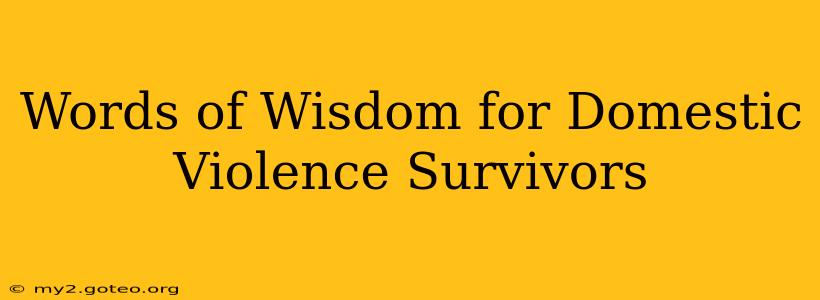Domestic violence is a pervasive issue affecting millions worldwide, leaving survivors grappling with emotional, physical, and psychological trauma. This isn't just about physical abuse; it encompasses a range of controlling behaviors designed to undermine a victim's self-worth and independence. If you're a survivor, know this: you are not alone, and healing is possible. This article offers words of wisdom, practical advice, and resources to guide you on your journey towards safety, recovery, and empowerment.
Understanding the Cycle of Abuse: Why Leaving Isn't Always Easy
Many survivors struggle to leave abusive relationships, and it's crucial to understand why. The cycle of abuse typically involves a pattern of tension building, followed by an abusive incident, then a period of remorse and reconciliation. This cycle creates a powerful emotional bond, making it incredibly difficult to break free, even when the abuse is severe. The abuser often employs manipulation and gaslighting, making the survivor question their own sanity and reality. This isn't a sign of weakness; it's a testament to the insidious nature of abuse.
What are the signs of domestic violence?
Domestic violence manifests in various ways, and recognizing the signs is the first step toward seeking help. Abuse isn't always physical; it can be emotional, verbal, financial, or even digital. Signs include:
- Physical abuse: Hitting, slapping, kicking, choking, or any other form of physical assault.
- Emotional abuse: Constant criticism, humiliation, threats, intimidation, isolation from friends and family, controlling behavior, gaslighting (making you doubt your own memory or sanity).
- Verbal abuse: Name-calling, insults, yelling, threats, constant criticism.
- Financial abuse: Controlling access to money, preventing you from working, or forcing you to hand over your earnings.
- Digital abuse: Monitoring your online activity, tracking your location, controlling your social media accounts, or sharing intimate images without your consent.
How can I escape an abusive relationship?
Leaving an abusive relationship can be incredibly dangerous and requires careful planning. It's often not a single event but a process that needs to be approached strategically.
- Develop a safety plan: This includes identifying safe places to go, having a bag packed with essentials, and informing trusted friends or family members about your situation. Consider contacting a domestic violence hotline or shelter for guidance.
- Seek professional help: Therapists specializing in trauma can provide support and guidance in navigating the complexities of leaving an abusive relationship. They can help you process the trauma, develop coping mechanisms, and build self-esteem.
- Financial planning: Leaving an abusive partner often involves financial challenges. Seek advice from financial advisors or legal professionals who can help you secure your finances and gain independence.
- Legal assistance: A lawyer can assist you with restraining orders, divorce proceedings, and child custody arrangements.
What resources are available for domestic violence survivors?
Numerous resources exist to support survivors, including:
- National Domestic Violence Hotline: Provides confidential support, crisis intervention, and referrals to local resources.
- Local Domestic Violence Shelters: Offer safe housing, counseling, and support services.
- The National Coalition Against Domestic Violence (NCADV): Offers information, resources, and advocacy for survivors.
- Legal Aid Organizations: Can provide legal assistance and representation to survivors.
How can I rebuild my life after escaping domestic violence?
Rebuilding your life after escaping domestic violence is a journey, not a destination. It takes time, patience, and self-compassion. Focus on:
- Self-care: Prioritize your physical and emotional well-being. Engage in activities that bring you joy and relaxation.
- Building a support system: Surround yourself with supportive friends, family, and professionals.
- Setting boundaries: Learn to assertively set boundaries in your relationships and protect your emotional well-being.
- Focusing on your goals: Set realistic goals for your personal and professional life.
Is it normal to feel confused and conflicted after leaving an abusive relationship?
Yes, absolutely. Feeling confused, conflicted, and even longing for the abuser are common experiences for survivors. The abuse often involves manipulation and emotional trauma that can lead to complex feelings. This is not a sign of weakness but a normal part of the healing process. Seeking professional help can provide valuable support in navigating these complex emotions.
What if I'm afraid to leave because of my children?
Leaving an abusive relationship with children is particularly challenging, but it's crucial to remember that children are affected by domestic violence, even if they don't directly witness physical abuse. Domestic violence shelters and support organizations have specialized programs to assist families in escaping abusive situations safely. Prioritize your children's safety and well-being, and seek professional guidance to develop a comprehensive safety plan.
Remember, healing takes time. Be patient with yourself, celebrate your progress, and know that you deserve a life free from violence and fear. You are strong, resilient, and deserving of happiness. Seek help, and never hesitate to reach out for support. Your life matters.

